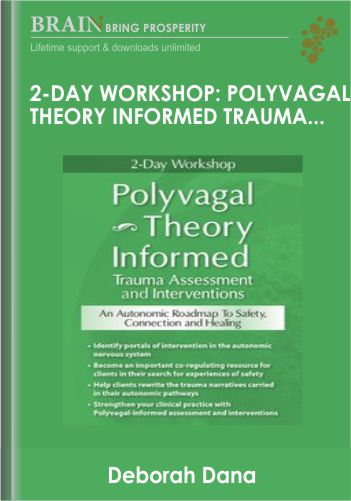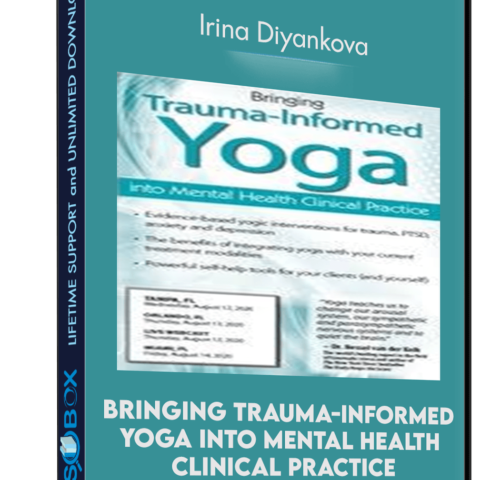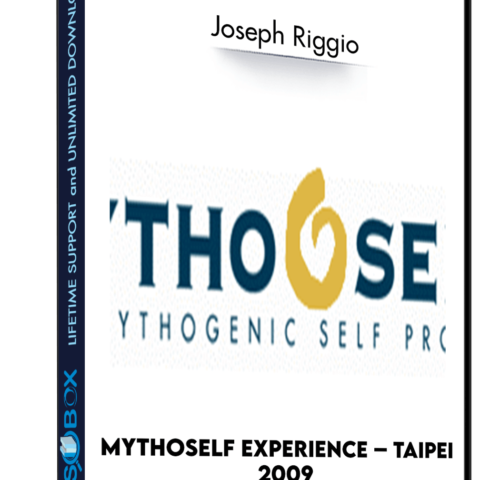2-Day Workshop: Polyvagal Theory Informed Trauma Assessment and Interventions: An Autonomic Roadmap to Safety, Connection and Healing – Deborah Dana
$53.00
Trauma resolution is not about thinking. Healing depends, instead, on the work undertaken at the level of the autonomic nervous system, which shapes our clients’ experiences… 2-Day Workshop: Polyvagal Theory Informed Trauma Assessment and Interventions: An Autonomic Roadmap to Safety, Connection and Healing – Deborah Dana
Description
Purchase 2-Day Workshop: Polyvagal Theory Informed Trauma Assessment and Interventions: An Autonomic Roadmap to Safety, Connection and Healing – Deborah Dana Course at eBokly. We actively participate in group buys and are committed to sharing knowledge with a wider audience. What's more, our courses maintain the same quality as the original sale page. You have the option to buy directly from the sale page at the full price (sale page link is provided within the post).
When purchasing 2-Day Workshop: Polyvagal Theory Informed Trauma Assessment and Interventions: An Autonomic Roadmap to Safety, Connection and Healing – Deborah Dana course, You can get it with the LIFETIME SUPPORT and UNLIMITED DOWNLOAD.
What will you get:
- polyvagal-theory-day-1.mp4
- polyvagal-theory-day-2.mp4
- manual.pdf
If our clients could have thought their way out of the impact of trauma, they would have done that a long time ago.
Trauma resolution is not about thinking. Healing depends, instead, on the work undertaken at the level of the autonomic nervous system, which shapes our clients’ experiences of safety and influences their capacity for connection. Traumatic events have a far-reaching impact on this system. Autonomic pathways trigger survival responses that often lead our clients on a painful journey into a state of shutdown, collapse, and dissociation. How can we help our clients find their way back to safety, and how do we prevent it from happening in the first place?
Polyvagal Theory, developed by Stephen Porges, offers a revolutionary roadmap to lead clients out of their adaptive survival responses into the autonomically regulated state of safety that is necessary for successful trauma treatment. Dr. Porges’ colleague and author of The Polyvagal Theory in Therapy, Deb Dana, shares this roadmap with you in this exciting recording.
You will become fluent in the language of Polyvagal Theory and confident in your ability to help clients safely tune into and reshape their nervous systems, and rewrite the trauma stories that are carried in their autonomic pathways. Come learn the organizing principles of Polyvagal Theory and work with practices designed to help clients move out of despair and isolation and return to a place of awareness, connection, and social engagement.
- Describe the principles of Polyvagal Theory and how to communicate them in client friendly language.
- Explore three circuits of the autonomic nervous system for the purpose of client psychoeducation.
- Analyze how the autonomic nervous system operates as an internal surveillance system and its impact on clients’ habitual responses to trauma.
- Determine how to help clients engage the regulating capacities of the autonomic nervous system in order to create an environment of safety.
- Explain how to exercise the Social Engagement System to assist clients in becoming more adept in skills of co-regulation and creating reciprocal relationships.
- Assess for patterns in clients’ autonomic states to better inform treatment planning.
- Summarize the trauma-informed therapist’s role as co-regulator and its impact on clinical outcomes.
- Identify portals of intervention in the autonomic nervous system to more effectively establish safety and treat trauma.
- Discover the right degree of neural challenge and exercises to employ with clients to help shape the autonomic nervous system toward safety and connection.
- Examine how to work with the cycle or reciprocity-rupture-repair in helping clients achieve the biological need for connection.
- Design a Polyvagal-informed clinical practice based on appropriate assessment and treatment planning.
- Examine ethical issues, research limitations, and potential risks to be considered by a Polyvagal-informed therapist
ESSENTIALS OF POLYVAGAL THEORY
- Evolution of the autonomic nervous system
- How trauma influences autonomic profiles
- Three organizing principles
- Neuroception: Detection without perception
- Hierarchy: 3 predictable pathways of response
- Coregulation: The biological imperative
NEUROCEPTION AND THE SHAPING OF AUTONOMIC PATHWAYS
- Understand the internal surveillance system
- Track cues of safety and danger
- Everyday “biological rudeness”
- Trauma, autonomic wisdom, and cognitive override
NAVIGATE THE AUTONOMIC HIERARCHY
- Exploring three autonomic circuits
- Sympathetic branch
- Ventral vagal pathway
- Dorsal vagal pathway
- How trauma shapes cycles of autonomic response
- Engage the regulating capacities of the autonomic nervous system
- Introduction to autonomic mapping
THE SOCIAL ENGAGEMENT SYSTEM
- The five elements of the Social Engagement System
- What happens when parts of the system are unavailable?
- Using the Social Engagement System to regulate states
- Exercising the Social Engagement System
TRACKING AUTONOMIC STATES
- Seeing patterns over time
- Use micro-moments to resource change
- Explore the blended states of play and stillness
- Create autonomic anchors
MEETING THE BIOLOGICAL NEED FOR CONNECTION
- Mapping the continuum of solitude to sociality
- Create safety in co-regulation
- Working with the cycle of reciprocity – rupture – repair
SHAPING THE AUTONOMIC NERVOUS SYSTEM TOWARD SAFETY
- Identify portals of intervention
- Create neural exercises
- Use breath as a regulator
- Resourcing new patterns through movement
- Explore the autonomic response to touch
- Use autonomic imagery
INCORPORATING POLYVAGAL THEORY IN CLINICAL PRACTICE
- Getting comfortable teaching Polyvagal Theory to clients
- Tracking the 8 steps of a Polyvagal-Informed clinical session
- Polyvagal-Informed assessment and treatment planning
- Polyvagal Theory and Phase I trauma treatment
RESPONSIBILITIES OF A POLYVAGALINFORMED THERAPIST
- The guiding questions
- Ethical considerations
- Research limitations and potential risks
Are you interested in? 2-Day Workshop: Polyvagal Theory Informed Trauma Assessment and Interventions: An Autonomic Roadmap to Safety, Connection and Healing – Deborah Dana Download, 2 day workshop agenda template, 2 day workshop cost, 2 day leadership workshop, medentry 2 day workshop, 2 day photography workshops
Purchasing 2-Day Workshop: Polyvagal Theory Informed Trauma Assessment and Interventions: An Autonomic Roadmap to Safety, Connection and Healing – Deborah Dana course now, You can get it with the LIFETIME SUPPORT and UNLIMITED DOWNLOAD.
Purchase the 2-Day Workshop: Polyvagal Theory Informed Trauma Assessment and Interventions: An Autonomic Roadmap to Safety, Connection and Healing – Deborah Dana course at the best price at eBokly. Upon completing your purchase, you will gain access to the downloads page. where you can conveniently retrieve all associated course files. Additionally, we will send you a download notification email to your registered mail.
Unlock your full potential with our 2-Day Workshop: Polyvagal Theory Informed Trauma Assessment and Interventions: An Autonomic Roadmap to Safety, Connection and Healing – Deborah Dana courses. Our courses are meticulously designed to empower you with the skills and knowledge needed for excellence.
Why wait? Take the first step towards greatness by acquiring our 2-Day Workshop: Polyvagal Theory Informed Trauma Assessment and Interventions: An Autonomic Roadmap to Safety, Connection and Healing – Deborah Dana courses today. We ensure a smooth and secure purchasing experience that guarantees your peace of mind. Rest assured that your financial information is safeguarded through our trusted payment gateways, Stripe and PayPal.
Stripe, renowned for its robust security measures, offers a secure and dependable payment process. Your sensitive data is encrypted using state-of-the-art technology, ensuring its confidentiality throughout the transaction.
PayPal, a globally recognized payment platform, adds an extra layer of security. With its buyer protection program, you can make your purchase with confidence, knowing that your financial details are protected, allowing you to focus on your learning journey.
Is it secure? to Use of?
- Rest assured, your identity remains completely confidential. We do not share your information with anyone, ensuring the utmost security when you buy the 2-Day Workshop: Polyvagal Theory Informed Trauma Assessment and Interventions: An Autonomic Roadmap to Safety, Connection and Healing – Deborah Dana course.
- 100% Safe Checkout Privateness coverage
- We employ robust communication and encryption methods to protect sensitive information. All card numbers are encrypted using AES at rest-256, and the transmission of card numbers occurs in a separate hosting environment, without sharing or storing any data.
How Will the Course Be Delivered?
- Upon successful payment for the “2-Day Workshop: Polyvagal Theory Informed Trauma Assessment and Interventions: An Autonomic Roadmap to Safety, Connection and Healing – Deborah Dana course”, Most of the products will come to you immediately. But for some products were posted for offer. Please wait for our response, it might take a few hours due to the time zone difference.
- If this occurs, kindly be patient. Our technical department will process the link shortly, and you will receive notifications directly via email. Your patience is greatly appreciated.
What Shipping Methods Are Available?
- You will receive a download link in the invoice or in YOUR ACCOUNT.
- The course link is always accessible. Simply log in to your account to download the 2-Day Workshop: Polyvagal Theory Informed Trauma Assessment and Interventions: An Autonomic Roadmap to Safety, Connection and Healing – Deborah Dana course whenever you need.
- You can study online or download the content for better results, making it accessible from any device. Ensure your system does not go to sleep during the download process..
How Do I Track Order?
- We promptly update the status of your order following your payment. If, after 7 days, there is no download link provided, the system will automatically process a refund..
- We love to hear from you. Please don’t hesitate to email us with any comments, questions and suggestions.
You must be logged in to post a review.









Reviews
There are no reviews yet.